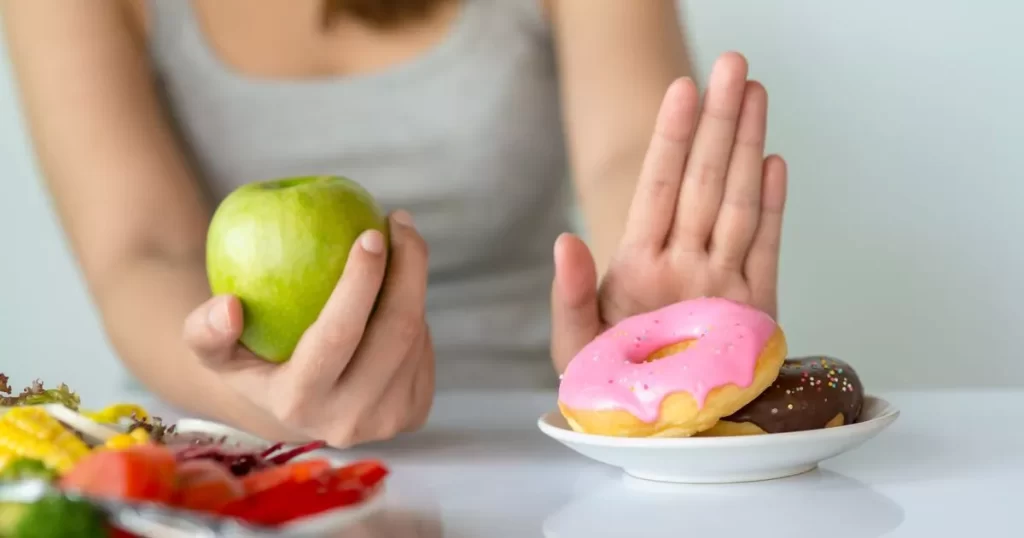We’re all familiar with the idea of counting calories. In fact, four in 10 of us are obsessed with it.* It’s science, isn’t it? Eat more calories than you burn = gain weight. Burn more than you eat = lose weight. So why is it hard to shift the pounds? And what if science has got it wrong? Those are the questions London UCH bariatric surgeon Andrew Jenkinson has asked during his studies of 2,000 obese people. “I was intrigued why someone would want me to remove their stomach rather than go on a diet. How could it be so difficult?” says Dr Jenkinson. “It got me thinking that maybe we had this wrong, that diets aren’t as simple as calories in and calories out; that there are other things going on with our metabolism.”
“Diets aren’t as simple as calories in and calories out”
The good news is he has proved restrictive diets don’t work. Even better, he knows how we can lose weight for good. But we need to understand the reasons before fixing the problem. So here comes the science bit in three simple steps… Wise up on your hormone signals Never heard of leptin? It’s the reason you’re not losing weight. Leptin is a hormone that comes from fat cells and is released into the bloodstream. The more fat cells you have, the more leptin.
The more fat cells you have, the more leptin
(Image: Getty)
“The hypothalamus, the part of your brain that controls your appetite and metabolism, reads the amount of leptin in your blood and determines whether you’ve got enough energy. If it thinks you’ve got too much, it will lessen your appetite and metabolism to stop you gaining too much weight. If your leptin signal is low, it senses you don’t have enough fat and will will make you want to eat and rest,” says Dr Jenkinson. The trouble is, for many of us – as much as half the population, he reckons – the leptin signalling system simply isn’t working. “Sugar and refined carbs, and too much regular snacking, mean insulin levels are high,” he says. “This insulin blocks the leptin so your brain can’t see it. If you’re overweight, your leptin signal will be really high but your brain will detect low leptin levels.” He likens this to the petrol gauge on a car breaking. “Imagine you’re driving and the petrol looks low. So you slow down to conserve fuel and then fill up. However, the car was actually already full – the petrol gauge was simply faulty.” Get to know your ‘weight set point’ Dr Jenkinson believes everyone has a “weight set point” – the weight your body wants to maintain. It will adapt to periods of more or less food to keep your weight stable. That’s why you might lose weight when you first start dieting, but then it stops.
Getting to know your body is important
(Image: Getty)
“Our bodies are good at adapting. That’s why restrictive diets are counterproductive. Ultimately, you can end up even heavier because the body wants more energy insurance in case there’s another diet on the horizon,” he says. “Think of your weight set point like an anchor on an elasticated rope. The further you try and move away from the anchor on a diet, the stronger the pullback. Starving yourself won’t help because you’ll put weight back on – and usually increase it.” Weight set points are controlled by genes and environment – food, stress and sleep. What you need to do, says Dr Jenkinson, is to “move the anchor from overweight waters and put it back down in normal waters. And the only way to do that is by making long-term changes to your diet and lifestyle.” Switch your food and lifestyle choices “Don’t go on a diet. Look at the types of food you’re eating and what they’re doing to your body to reset your weight set point and fix leptin signals,” advises Dr Jenkinson. “If you change those foods, you can lose weight forever, rather than make things worse.”
Eating more meat, fish, vegetables and dairy products could have a positive effect
(Image: Getty)
Reduce: Sugar and refined carbohydrates, fructose (found in fruit and honey) and vegetable oils. Sugary foods, like cakes and biscuits, and fructose directly block leptin. Vegetable oils have an inflammatory effect, which increases insulin and impacts on leptin signals.
Why we eat (too much): the new science of appetite by Dr Andrew Jenkinson is out now
Increase: Meat, fish, vegetables and dairy products, and cook in olive oil. Eat more saturated fat and protein and you won’t be hungry. Sleep and stress are key, Dr Jenkinson says. “Being tired or stressed raises cortisol, making you hungry. It also increases insulin which causes leptin resistance.” Why we eat (too much): the new science of appetite by Dr Andrew Jenkinson (Penguin Life, £9.99) is out now *According to research by Cytoplan READ NEXT: Click here for today’s top showbiz news Marks and Spencer’s ‘magic’ £19 slimming leggings hailed as ‘most flattering ever’ Inside Harry and Meghan’s ‘private island plans’ after Frogmore eviction Eastenders’ Letita Dean’s transformation through the years after dropping four dress sizes Get exclusive celebrity stories and shoots straight to your inbox with OK!’s daily newsletter Story SavedYou can find this story in My Bookmarks.Or by navigating to the user icon in the top right.Follow OK! MagazineFacebookTwitterMore OnHealth












